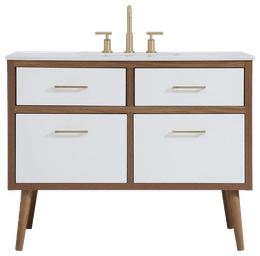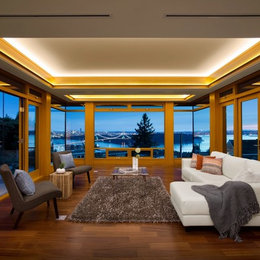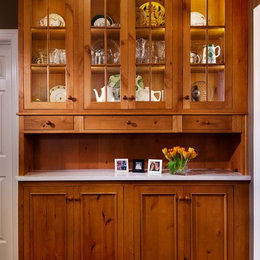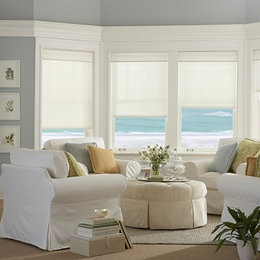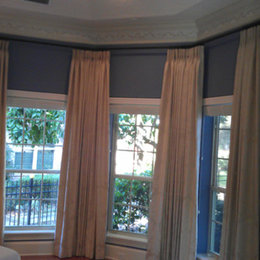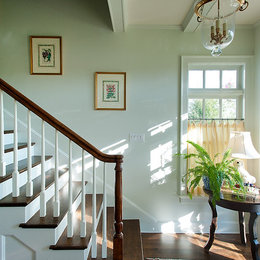FREE shipping on orders over $49!* Details
Windows
Item 1 of 15
Sort by:
Price
112 Results
Best Seller
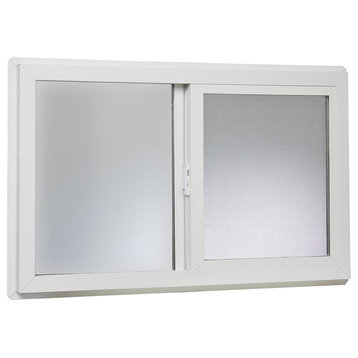
32x20 Vinyl Left, Hand Sliding Window with Dual Pane Insulated Glassby TAFCO(880)
$105
The TAFCO basement slider window is manufactured with a heavy-duty extruded welded vinyl sash and main frame. The sash glides effortlessly, interlocking with the main frame ensuring a weather-tight seal. Insulated glass and durable wool pile seals keep cold air out and warm air in. Included is an easily removable full screen to keep insects out. The TAFCO basement slider window is the perfect choice for your new construction or remodeling needs.
Best Seller
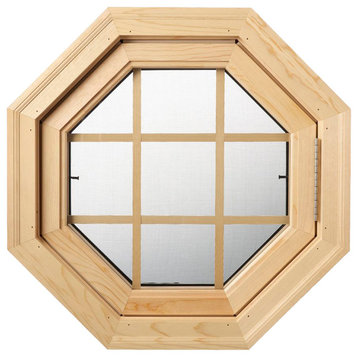
Large Cabin Breeze, 24x24 Venting Window, Low-E Ig, Right Handby JJJ Specialty Company(42)
$375
Let even more air and light in with our Right Hand Hinged Large Cabin Breeze All Wood low-e IG venting octagon window offers style as well as functionality. The window has a removable fiberglass screen and utilizes a Dyad Operator allowing increased air flow. The venting hardware features a flip-lever lock and the folding handle roto operator provides a safe and elegant interior appearance. The entire unit is manufactured using Ponderosa Pine and is unfinished ready for paint or stain.
Best Seller
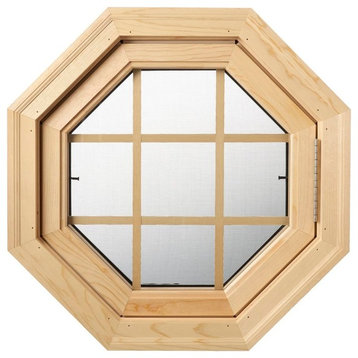
Cabin Breeze Wood Venting Window, Hinge, Hinged Rightby JJJ Specialty Company(75)
$330
Style and function come together in the rustic Cabin Breeze Venting Window. The octagonal frame features a hinged panel, which opens up to allow for a fresh breeze. This window uses a dyad operator, allowing for increased air flow and ventilation. Like a porthole in a ship, this window offers distinct seaside vibes. Install the Cabin Breeze and imagine you are overlooking a New England bay.
- Venting window
- Removable fiberglass screen
- Right hinge
- Interior trim not included
- Hardware features a flip-lever lock
- Folding handle roto operator provides a safe and stylish interior
- Color: Unfinished
- Materials: Glass, Ponderosa pine and fiberglass
- Frame dimensions: W 21.625" x H 21.625"
- Rough opening size: W 22.25" x H 22.25"
- Brickmold size: W 24.25" x H 24.25"
- Overall dimensions: W 24.5" x D 5.94" x H 24.5"
Best Seller
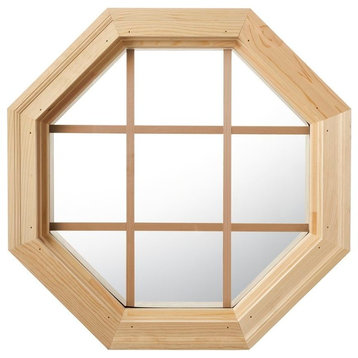
Cabin Light 4 Season Wood Window With Grille, Clear Insulated Glassby JJJ Specialty Company(30)
$195
Let the sun shine in with a 4 Season Cabin Light stationary octagon window from JJJ Specialty Co. The entire unit is manufactured using Ponderosa Pine and is unfinished ready to paint or stain to match your decor. The window features a 9 light pine removable grille and 2 glass types: clear insulated and Low-E insulated. The unit has a 4-11/16" deep jamb ready to install in 2 x 4 construction. Extension jamb and interior trim kit sold separately.
- Frame Size: 21-5/8" x 21-5/8"
- Fits Rough Opening: 22-1/4" x 22-1/4"
- Brickmold Size: 24-1/2" x 24-1/2"
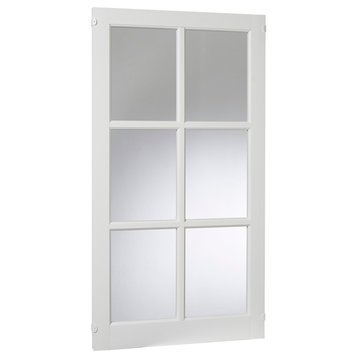
22x41.25 Utility Fixed Picture Vinyl Window with Gridby TAFCO(6)
SALE
$102$117
The TAFCO Utility Barn Sash that is manufactured to the same specification as traditional barn sashes. This window is the perfect choice to add decoration to any barn, shed, garage or any utility application. The TAFCO Utility Barn Sash is a beautiful, yet affordable, window.
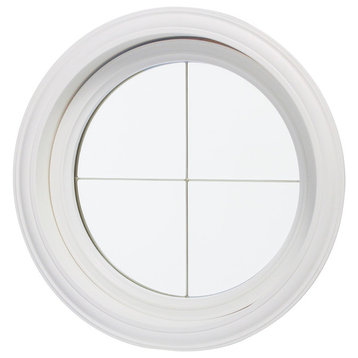
24.5x24.5 Round Geometric Vinyl Window, Platinum Cross Design, Clear Glassby TAFCO(4)
$385
Tafco Decor Specialty Windows have ornate custom glass that offers beauty and privacy with a leaded look (platinum grid) glass finish inserted between two pieces of clear glass. The leaded look glass is then sealed for energy efficient triple glazing in our solid heavy decorative main frame. All Tafco decor specialty Windows frames are completely maintenance free. Tafco decor specialty windows are the perfect choice to set your home apart from all the rest.
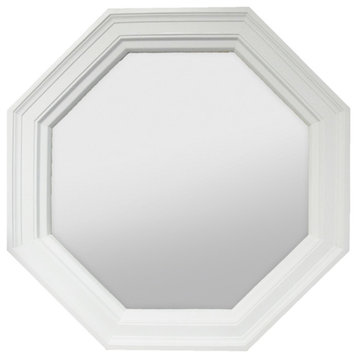
Large Town Light 4 Season Primed Poly, No Grille, 2-9/16" Jambby JJJ Specialty Company(2)
$253
Our Large 4 Season Town Light window is ready for a North Shore winter or desert summer. The solid polyurethane exterior frame is a perfect choice against weather and pests. It has no exterior seams or butt joints as found in traditional wood, vinyl or aluminum windows. Plus, you still get the beauty of wood with our stain grade interior jamb. The Town Light window includes a 2-9/16" jamb and 2" jamb extensions are available on the Poly Accessories page. The exterior is primed ready to paint the color of your choice and install!
Best Seller
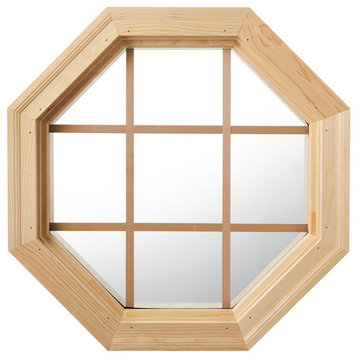
Large Cabin Light 4 Season Wood Window With Grille, Low-E Insulated Glassby JJJ Specialty Company(21)
$256
Let the sun shine in with a 4 Season Large Cabin Light octagon window from JJJ Specialty Co. The entire unit is manufactured using Ponderosa Pine and is unfinished ready to paint or stain to match your decor. The window features a 9 light pine removable grille and 2 glass types: clear insulated and Low-E insulated. The unit has a 4-11/16" deep jamb ready to install in 2 x 4 construction. Extension jamb and interior trim kit sold separately.
- Frame Size: 23-1/8" x 23-1/8"
- Fits Rough Opening: 23-5/8" x 23-5/8"
- Brickmold Size: 26-1/8" x 26-1/8"
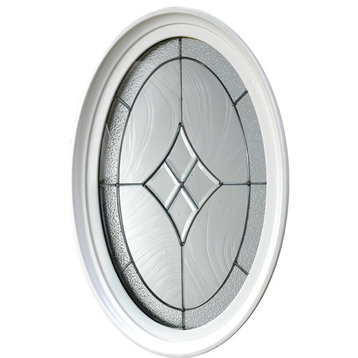
20x28.75 Oval Geometric Vinyl Window, Platinum Designby TAFCO(3)
$385
Beautiful ornate custom glass offers beauty and privacy with a leaded (platinum or gold) glass finish. Inserted between two pieces of clear glass, the leaded glass is then sealed for energy efficient triple glazing in our solid heavy decorative main frame. Custom beveled glass pieces add beauty and depth to all designs. Tafco Specialty Oval and Round Windows are the perfect choice to set your home apart from all the rest.
32x22 Hopper Vinyl Windowby TAFCO(33)
$123
The TAFCO Hopper Window is manufactured with a heavy-duty, extruded welded vinyl sash and main frame. The window tilts inward for easy cleaning and operation. Insulated glass and durable wool pile seals keep cold air out and warm air in. Included is an easily removable full screen to keep insects out. The TAFCO hopper window is the perfect choice for your new construction or remodeling needs.
24x36 Single Hung Vinyl Window, Insulated withGrid, Primary Balanceby TAFCO(9)
$167
The TAFCO Single Hung Vinyl Window is manufactured with a heavy duty extruded welded vinyl sash and main frame. The operating sash tilts inward for easy cleaning. Insulated glass and durable wool pile seals keep cold air out and warm air in. Included is an easily removable screen to keep insects out. The TAFCO Single Hung Vinyl Window is the perfect choice for your new construction or remodeling needs.
Best Seller
Rambler Breeze 4 Season Poly Window, Grille, Hinged Left, White, Clear Insulatedby JJJ Specialty Company(2)
$498
When your home gets a bit stuffy, look to the Rambler Breeze Window. This window is quite literally a breath of fresh air in your design, easily pushing open to let in the afternoon breeze or crisp morning air. And, with an octagonal shape and versatile white finish, the Rambler Breeze ushers in a bit of refreshing style as well.
- Left-hinged molded polyurethane octagon window
- Clear insulated glass
- Features a 9 light-pine removable grille, bronze removable fiberglass screen
- Window utilizes a flip-lever lock and folding handle roto operator for smooth operation
- Dyad operator allows the window to open the sash further for additional air flow
- Installs with vinyl nailing fin (included)
- Features 4.688"-deep jamb ready to install in 2'x4' construction
- Extension jamb and interior trim kit sold separately
- Color: White
- Materials: Poly foam, wood and glass
- Dimensions: W 22.25" x D 6.25" x H 22.25"
- Fits rough opening: W 22.75" x H 22.75"
- Fits
14x27 Mobile Home Single Hung Aluminum Window, Siliverby TAFCO(7)
$100
The Tafco Mobile Home Window will add beauty and more light into your home. The single hung style operates, up and down, making it easy to bring in fresh air. This window is the perfect choice for any mobile home.
Best Seller
Cabin Breeze Wood Vent Oct Window W/Grille RH, Primed White Exterior With Clearby JJJ Specialty Company(6)
$378
Style and function come together in the rustic Cabin Breeze Venting Window. This white primed exterior unit with clear insulated glass is ready to accept paint and the interior is unfinished so you can paint or stain to match your decor.
The octagonal frame features a right hand hinged panel, which opens up to allow for a fresh breeze. This window uses a dyad operator, allowing for increased air flow and ventilation. Like a porthole in a ship, this window offers distinct seaside vibes. Install the Cabin Breeze and imagine you are overlooking a New England bay.
The octagonal frame features a right hand hinged panel, which opens up to allow for a fresh breeze. This window uses a dyad operator, allowing for increased air flow and ventilation. Like a porthole in a ship, this window offers distinct seaside vibes. Install the Cabin Breeze and imagine you are overlooking a New England bay.
Best Seller
Cabin Breeze Wood Vent Oct Window W/Grille RH, Primed Complete With Low-E Glassby JJJ Specialty Company(6)
$419
Style and function come together in the rustic Cabin Breeze Venting Window. This white primed unit with Low-E insulated glass is ready to accept paint for both exterior and interior.
The octagonal frame features a right hand hinged panel, which opens up to allow for a fresh breeze. This window uses a dyad operator, allowing for increased air flow and ventilation. Like a porthole in a ship, this window offers distinct seaside vibes. Install the Cabin Breeze and imagine you are overlooking a New England bay.
The octagonal frame features a right hand hinged panel, which opens up to allow for a fresh breeze. This window uses a dyad operator, allowing for increased air flow and ventilation. Like a porthole in a ship, this window offers distinct seaside vibes. Install the Cabin Breeze and imagine you are overlooking a New England bay.
18x24 Single Hung Vinyl Windowby TAFCO(291)
$119
The TAFCO Single Hung Vinyl Window in White with Single Glass and Screen features an interlocking weather-tight and solid construction that is designed for superb performance. A built-in J-channel accepts all types of sidings for versatile installation. The TAFCO WINDOWS slider vinyl window is the perfect choice for garages, porches, barns and steel buildings.
Oval Interior Trim Kitby JJJ Specialty Company(1)
$162
Give your JJJ Specialty Co oval window that "Final Touch" with a Moulded Polyurethane interior trim kit. The kit contains 1 piece moulded poly trim ring measuring 3/4" thick x 2-1/4" wide Colonial Profile.Casing has deep embossed wood grain texture ready to paint or stain to match your decor.
BarnwoodUSA Rustic Wood Window Frames, 100% Authentic Reclaimed Wood, Weatheredby BarnwoodUSA(5)
$35
Free Shipping
This rustic looking wood window frame will be the perfect addition to your country or primitive decor. Its rustic appeal will last for years. Pair it with our reclaimed wood photo frame or decorative ladder to re-create a countryside theme.
- It is made of 100% authentic, eco-friendly, reclaimed wood.
- Due to nature of wood, imperfections such as knots, nail holes, etc. are common.
- Our wood window frames are very sturdy and easy to use. Sawtooth hangers are included for easy installation.
- Outer dimensions are 22 by 18 by 4 inches. Slot dimensions are 7.5 by 5.5 inches.
- Made in USA.
Mini Cabin Light 4 Season Wood Windowby JJJ Specialty Company(7)
$144
Let the sun shine in with a 4 Season Mini Cabin Light octagon window from JJJ Specialty Co. The entire unit is manufactured using Ponderosa Pine and is unfinished ready to paint or stain to match your decor. Standard features include dual pane insulated glass.
The unit has a 4-11/16" deep jamb ready to install in 2 x 4 construction. Extension jamb and interior trim kit sold separately. Frame Size: 14-1/16" x 14-1/16"
The unit has a 4-11/16" deep jamb ready to install in 2 x 4 construction. Extension jamb and interior trim kit sold separately. Frame Size: 14-1/16" x 14-1/16"
- Fits Rough Opening: 14-3/4" x 14-3/4"
- Brickmold Size: 17" x 17"
Best Seller
Cabin Light Oval, 4 Seasons, Diamond Grilleby JJJ Specialty Company(7)
$891
Our Cabin Light molded polyurethane stationary oval window is an excellent choice for residential or commercial use. It can be used as an accent window near a front entry, a Gable end, a Dormer window, or any space where additional light is needed. The clear glass window with Diamond Pattern removable grille features a deep embossed wood grain texture inside and out that is suitable for paint or stain to match any decor. The Brickmold exterior gives the appearance of a wood window but without the maintenance a wood window requires. Polyurethane is a rigid dense foam that is not affected by moisture and is impervious to insects and vermin. The unit's frame measures 20-1/16" x 31-1/2" to fit a 20-9/16" x 31-7/8" rough opening and has a 4-9/16" deep jamb ready to install in 2 x 4 construction.
Cabin Breeze Wood Vent Oct Window Low-E IG W/Grille LH Primed White Completeby JJJ Specialty Company(3)
$419
Style and function come together in the rustic Cabin Breeze Venting Window. This white primed unit with Low-E insulated glass is ready to accept paint for both exterior and interior.
The octagonal frame features a left hand hinged panel, which opens up to allow for a fresh breeze. This window uses a dyad operator, allowing for increased air flow and ventilation. Like a porthole in a ship, this window offers distinct seaside vibes. Install the Cabin Breeze and imagine you are overlooking a New England bay.
The octagonal frame features a left hand hinged panel, which opens up to allow for a fresh breeze. This window uses a dyad operator, allowing for increased air flow and ventilation. Like a porthole in a ship, this window offers distinct seaside vibes. Install the Cabin Breeze and imagine you are overlooking a New England bay.
27" x 45" Rough Opening Frame, In-Swing Egress, 3/4" Insulated Low-E Glassby Wellcraft Egress Systems
$726
Free Shipping
This easy to use in-swing window is 27" x 45" and meets IRC Building Code for Egress. Vinyl frame is maintenance free. The fiberglass full screen is removable from the inside.
- 3/4" insulated Low-E glass is standard - U-value of 0.37
- Frame Dimensions: 27" x 45"
- Net Clear Opening: 20-1/8" x 40-7/8" (5.71 sq. ft., when sash opened in normal inward position)
- Neat Clear Glass Opening: 20-3/8" x 38-3/8" (5.43 sq. ft.)
Cabin Light Round Window, No Grilleby JJJ Specialty Company(1)
$521
Our Cabin Window is an excellent choice for brightening up your home design. It can be used as an accent window near a front entry, a Gable end, a Dormer window, or any space where additional light is needed. The window features a deep embossed wood grain texture inside and out that is suitable for paint or stain to match any decor. The brick mold exterior gives the appearance of a wood window but without the maintenance a wood window requires. Polyurethane is a rigid dense foam that is not affected by moisture and is impervious to insects and vermin. The unit's frame measures 23-9/16" x 23-9/16" to fit a 24" x 24" rough opening and has a 4-9/16" deep jamb ready to install in 2 x 4 construction.
- Materials: Molded Polyurethane
- Assembly: Yes
- Warranty: 30 days against manufacturing defects
- Dimensions: W 26.25" x D 6" x H 26.25"
- Design: No Grille
Best Seller
Meadow View Garden Window White, 36"x36", Oak Seat Board, Low-E Insulated Glassby Meadow View Garden Window(17)
$2,899
Free Shipping
Gaze out over your land — whether you've got a parcel or a plot — through the Meadow View Garden Window. This window retrofits your home or greenhouse with a clean design that opens easily so you can admire your flowerbed or the local wildlife. Expose your space to style and fresh air with this window.
- Tab-less BetterVue screens
- Roto operated front opening sash
- DP Ratings include DP 80 for water and a DP 60 for structural
- Triple-sealed sash and tempered top lite
- 10.25" deep glass shelf
- 4.56" jamb and dual locking hardware
- 1.5" thick insulated seat board
- Color: White
- Materials: Vinyl, glass and wood
- Dimensions: W 35.5" x D 21.5" x H 35.5"
Best Seller
Tall Cabin Light 4 Season Wood Window With Grille, Low-E Insulated Glassby JJJ Specialty Company(7)
$400
Let the sun shine in with a 4 Season Tall Cabin Light octagon window from JJJ Specialty Co. The entire unit is manufactured using Ponderosa Pine and is unfinished ready to paint or stain to match your decor. The window features a 12 light pine removable grille and 2 glass types: clear insulated and Low-E insulated. The unit has a 4-11/16" deep jamb ready to install in 2 x 4 construction. Extension jamb and interior trim kit sold separately.
- Frame Size: 21-5/8" x 35-5/8"
- Fits Rough Opening: 22-1/4" x 36-1/4"
- Brickmold Size: 24-1/2" x 38-1/2"
Large Four Season Town Light, White Poly, With Grille 2-9/16" Jambby JJJ Specialty Company(1)
$286
Our Large 4 Season Town Light window is ready for a north shore winter or desert summer. The solid polyurethane exterior frame is a perfect choice against weather and pests. It has no exterior seams or butt joints as found in traditional wood, vinyl or aluminum windows. Plus, you still get the beauty of wood with our stain grade interior jamb. The Town Light window includes a 2-9/16" jamb and 2" jamb extensions are available on the Poly Accessories page. The unit comes with a 9 light pine unfinished removable grille, The exterior is pre-finished white ready to install!
Trim Kit For Wood Vent Octagon Window, Pineby JJJ Specialty Company(4)
$78
Give your wood venting octagon window that "Final Touch" with a Pine interior trim kit from JJJ
Specialty Co. The kit contains 8 pieces of pre-mitered trim in a 5/8" thick x 2-1/4" wide #332 Colonial Profile. Also available in unfinished Oak species ready to paint or stain to match your decor.
Specialty Co. The kit contains 8 pieces of pre-mitered trim in a 5/8" thick x 2-1/4" wide #332 Colonial Profile. Also available in unfinished Oak species ready to paint or stain to match your decor.
Best Seller
4 Season Large Town Light Poly Window Grille, Full 4-9/16" Jamb, White, Low-E Insulated Glassby JJJ Specialty Company(7)
$398
The Large Town Light Full Jamb 4 Season octagon window from JJJ Specialty Co. gives you the classic look of wood with the all-weather durability of a seamless polyurethane exterior. The exterior is prefinished classic white with dual pane annealed Low-E insulated glass to keep the heat inside for winter and outside in summer. It features a full 4-9/16" jamb for a ready fit into a standard 2x4 construction wall. The window includes a 9 light pine removable grille. The interior is unfinished pine ready to paint or stain to match any decor.
Durango Architectural Window, Turquoiseby Mexican Imports(8)
$127
This architectural window is great for any room including outdoors. If you wish to hang it outside, a very thick coat of polyurethane sealer will keep it intact. Please remember that this is all handmade of wood and iron and will be one of a kind. It is available in the following colors - red, turquoise and white.
Best Seller
Cabin Breeze Wood Vent Oct Window W/Grille RH, Primed White Exterior With Low-Eby JJJ Specialty Company(6)
$412
Style and function come together in the rustic Cabin Breeze Venting Window. This white primed unit with Low-E insulated glass is ready to accept paint for both exterior and interior.
The octagonal frame features a right hand hinged panel, which opens up to allow for a fresh breeze. This window uses a dyad operator, allowing for increased air flow and ventilation. Like a porthole in a ship, this window offers distinct seaside vibes. Install the Cabin Breeze and imagine you are overlooking a New England bay.
The octagonal frame features a right hand hinged panel, which opens up to allow for a fresh breeze. This window uses a dyad operator, allowing for increased air flow and ventilation. Like a porthole in a ship, this window offers distinct seaside vibes. Install the Cabin Breeze and imagine you are overlooking a New England bay.
Best Seller
Cabin Breeze Wood Vent Oct Window W/Grille RH, Primed Complete With Clear Glassby JJJ Specialty Company(6)
$386
Style and function come together in the rustic Cabin Breeze Venting Window. This white primed unit with clear insulated glass is ready to accept paint for both exterior and interior.
The octagonal frame features a right hand hinged panel, which opens up to allow for a fresh breeze. This window uses a dyad operator, allowing for increased air flow and ventilation. Like a porthole in a ship, this window offers distinct seaside vibes. Install the Cabin Breeze and imagine you are overlooking a New England bay.
The octagonal frame features a right hand hinged panel, which opens up to allow for a fresh breeze. This window uses a dyad operator, allowing for increased air flow and ventilation. Like a porthole in a ship, this window offers distinct seaside vibes. Install the Cabin Breeze and imagine you are overlooking a New England bay.
Cabin Breeze Wood Vent Oct Window Clear IG W/Grille LH Primed White Exteriorby JJJ Specialty Company(3)
$378
Style and function come together in the rustic Cabin Breeze Venting Window. This white primed exterior unit with clear insulated glass is ready to accept paint and the interior is unfinished so you can paint or stain to match your decor.
The octagonal frame features a left hand hinged panel, which opens up to allow for a fresh breeze. This window uses a dyad operator, allowing for increased air flow and ventilation. Like a porthole in a ship, this window offers distinct seaside vibes. Install the Cabin Breeze and imagine you are overlooking a New England bay.
The octagonal frame features a left hand hinged panel, which opens up to allow for a fresh breeze. This window uses a dyad operator, allowing for increased air flow and ventilation. Like a porthole in a ship, this window offers distinct seaside vibes. Install the Cabin Breeze and imagine you are overlooking a New England bay.
Large Four Season Town Light, White Poly, Low-E with Grille 2-9/16" Jambby JJJ Specialty Company(1)
$319
Our Large 4 Season Town Light window with Low-E glass is ready for a north shore winter or desert summer. The solid polyurethane exterior frame is a perfect choice against weather and pests. It has no exterior seams or butt joints as found in traditional wood, vinyl or aluminum windows. Plus, you still get the beauty of wood with our stain grade interior jamb. The Large Town Light window includes a 2-9/16" jamb and 2" jamb extensions are available on the Poly Accessories page. The unit comes with a 9 light pine unfinished removable grille, The exterior is pre-finished white ready to install!
Round Inside Trim Kitby JJJ Specialty Company(3)
$149
Give your JJJ Specialty Co. Poly Round window that "Final Touch" with a Poly interior trim kit. The kit contains 1 piece moulded polyurethane 3/4" thick x 2-1/4" wide Colonial Profile casing. The product has a deep embossed wood grain texture ready to paint or stain to match your decor. Product dimensions: 27-1/4" x 27-1/4" x 3/4".
Large Size Replacement Octagon Wood Sash Hinged Left Low-Eby JJJ Specialty Company(5)
$198
The "Large Size Replacement Wood Sash" is our all pine octagon sash only with Low-E insulated glass and designed to fit Houzz Large size left hinge wood venting octagon windows. (Large Cabin Breeze) It is available unfinished ready to paint the color of your choice. Sash measures 21-1/4" x 21-1/4" x 1-11/16".
Round 2" Jamb Extensionby JJJ Specialty Company(4)
$149
The round jamb extension is designed to extend the standard 4-9/16" jamb to 6-9/16" for thicker wall. The item is made of moulded polyurethane foam, same material as the window. The visible surfaces of the jamb extension have a deep embossed wood grain texture. The material is ready to paint or stain and will match the interior of either the Cabin Light Brickmold Round Window or the Rambler Clad Profile Round Window. The product can be cut to meet the exact wall thickness desired and nailed just like wood to attach to the window and is impervious to moisture and insects. Product dimensions: O.D. 23-11/16" x 23-11/16" x 2" Deep.
The right windows can dramatically change the environment of your home. Not only can windows enhance your views, but they can help control your interior temperature through ventilation and insulation. Windows can be a pricey investment, so be sure to do your research before you make any financial commitments.
Consider function, your home’s style and maintenance to make this choice. First, decide whether you want the window to act as a source of ventilation by choosing between operable windows (slide up, down or sideways) or fixed windows (stay permanently shut, primarily accent windows). From there, determine the style you’d like. Perhaps you’ll want to outfit your bathroom with a horizontal slider window for a window that offers a fresh breeze by easily pushing open the glass panels. Awning windows are great for below ground basements: they are horizontal and tilt out at the bottom, adding just enough sunlight and air. If you want take in a beautiful view, install bay windows which project from the wall and let you make the most of your scenery.
If you have the choice, choose wisely. Consider the amount of sunlight you want to infuse in each space with your window placement. Windows that face the east and west will capture the sunrise and sunset, which may result in an of natural sunlight for your space. North-facing windows will illuminate your room with soft, diffused light, while a south-facing window is often the most desirable, as it lets in the most light without being overly intense.
In general, windows are made from wood, aluminum, steel, vinyl or fiberglass. Read below to find out the benefits and disadvantages of each material.
• Wood: A common choice for windows, wood is durable and prevents the cold and condensation from coming inside. Make sure you’ve treated it, otherwise it may warp and rot over time.
• Clad wood: This type of material is basically wood covered in an exterior jacket made of aluminum of vinyl which eases maintenance issues like preventing rust and rot.
• Vinyl: Resistant to heat loss and condensation, vinyl windows are inexpensive but may become distorted if exposed to extreme heat or cold.
• Steel: One of the pricier options, steel windows are attractive, easy to maintain and long lasting.
• Aluminum: Lightweight and durable, aluminum windows are insulated with vinyl and foam to help reduce heat loss and condensation. Moist, salty air may deteriorate aluminum windows if they are not properly treated.
Windows are generally measured by an U-factor and an R-factor. The U-factor measures a window’s ability to conduct heat, while the R-factor measures the window’s ability to insulate. Windows of the best efficiency will have a low U-factor and a high R-factor.
For an added layer of insulation, you may want to think about double-glazing your windows by creating a sealed space between two panes of glass. Fill the space with gas, such as argon or krypton, to create even better insulation than air provides. Or, perhaps you want a low-emissivity coating applied to your windows to better control heat gain and loss, depending on the season.
What types of windows should I consider?
Consider function, your home’s style and maintenance to make this choice. First, decide whether you want the window to act as a source of ventilation by choosing between operable windows (slide up, down or sideways) or fixed windows (stay permanently shut, primarily accent windows). From there, determine the style you’d like. Perhaps you’ll want to outfit your bathroom with a horizontal slider window for a window that offers a fresh breeze by easily pushing open the glass panels. Awning windows are great for below ground basements: they are horizontal and tilt out at the bottom, adding just enough sunlight and air. If you want take in a beautiful view, install bay windows which project from the wall and let you make the most of your scenery.
Where should I place my windows?
If you have the choice, choose wisely. Consider the amount of sunlight you want to infuse in each space with your window placement. Windows that face the east and west will capture the sunrise and sunset, which may result in an of natural sunlight for your space. North-facing windows will illuminate your room with soft, diffused light, while a south-facing window is often the most desirable, as it lets in the most light without being overly intense.
What materials should I consider for my windows?
In general, windows are made from wood, aluminum, steel, vinyl or fiberglass. Read below to find out the benefits and disadvantages of each material.
• Wood: A common choice for windows, wood is durable and prevents the cold and condensation from coming inside. Make sure you’ve treated it, otherwise it may warp and rot over time.
• Clad wood: This type of material is basically wood covered in an exterior jacket made of aluminum of vinyl which eases maintenance issues like preventing rust and rot.
• Vinyl: Resistant to heat loss and condensation, vinyl windows are inexpensive but may become distorted if exposed to extreme heat or cold.
• Steel: One of the pricier options, steel windows are attractive, easy to maintain and long lasting.
• Aluminum: Lightweight and durable, aluminum windows are insulated with vinyl and foam to help reduce heat loss and condensation. Moist, salty air may deteriorate aluminum windows if they are not properly treated.
How can I measure the efficiency of my windows?
Windows are generally measured by an U-factor and an R-factor. The U-factor measures a window’s ability to conduct heat, while the R-factor measures the window’s ability to insulate. Windows of the best efficiency will have a low U-factor and a high R-factor.
What features might I consider for my windows?
For an added layer of insulation, you may want to think about double-glazing your windows by creating a sealed space between two panes of glass. Fill the space with gas, such as argon or krypton, to create even better insulation than air provides. Or, perhaps you want a low-emissivity coating applied to your windows to better control heat gain and loss, depending on the season.
Complete Your Project
Browse products to finish your project
Item 1 of 1
Join the discussion about “Windows”
Get advice from our community of pros & homeowners
Change picture window to functioning window(s), what style?
by dbr463
Building a HomeWindowsDesign Dilemma
16
 +14
+14
Okna Windows Bay Window / Bow Window Price
by Alison G
Windows
5
 +3
+3
Windows, Windows and Windows !!!!
by Ravi Ramnath
Windows
32
 +30
+30
Frameless Window, Picture Frame Window, or Window with Sill?
by R R
Building a HomeWindowsKitchens
17
 +15
+15
Trying to find a semi sheer window treatment for a 5 window bay window
by Jane Vargo
Home DecoratingWindows
5
 +3
+3
Item 1 of 5







